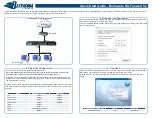
19
Solution
To resolve the problem:
1.
Verify that the speed and duplex mode of the local port match the speed and duplex mode of
the peer port:
a.
Execute the
display interface brief
command to examine whether the speed and duplex
mode of the port match the speed and duplex mode of the peer port.
b.
If they do not match, use the
speed
command and the
duplex
command to set the rate and
duplex mode for the port.
2.
Verify that the speed and duplex mode of the local port match the speed and duplex mode of
the transceiver module:
a.
Execute the
display interface brief
command to examine whether the speed and duplex
mode of the port match the speed and duplex mode of the transceiver module.
b.
If they do not match, use the
speed
command and the
duplex
command to set the rate and
duplex mode for the port.
3.
Verify that the ports at both ends are operating correctly:
a.
For a 10-GE SFP+ fiber port, use an SFP+ cable (used for connection over a short distance)
to directly connect it to another 10-GE SFP+ fiber port on the local end. For a GE SFP port,
use a GE SFP cable (used for connection over a short distance) to directly connect it to
another GE SFP port on the local end.
b.
Identify whether the port can come up:
−
If the port can come up, you can determine that the peer port fails. Replace the peer port
with a new port that operates correctly.
−
If the port cannot come up, you can determine that the local port fails. Replace the local
port with a new port that operates correctly.
4.
Verify that the transceiver module and cable are operating correctly:
a.
Use the
display transceiver alarm interface
command to display the alarms present on
the transceiver module:
−
The device displays
None
if no error occurs.
−
The device displays alarms if the transceiver module fails or the type of the transceiver
module does not match the port type.
b.
Use an optical power meter to verify that the Tx power and Rx power of the transceiver
module are stable and are within the correct range.
c.
Execute the
display transceiver interface
command to verify that the wavelength and
transmission distance of the local transceiver module are consistent with the wavelength
and transmission distance of the peer transceiver module.
d.
If the transceiver module is not operating correctly, replace it with an HPE transceiver
module that matches the fiber port.
For more information about transceiver modules and cables, see the installation guide.
5.
Verify that the fiber matches the transceiver module. If they do not match, replace the fiber with
a new one that matches the transceiver module.
For more information about fibers, see the installation guide.
6.
If the problem persists, contact Hewlett Packard Enterprise Support, and provide the following
information:
<Sysname> display diagnostic-information
Save or display diagnostic information (Y=save, N=display)? [Y/N]:Y












































